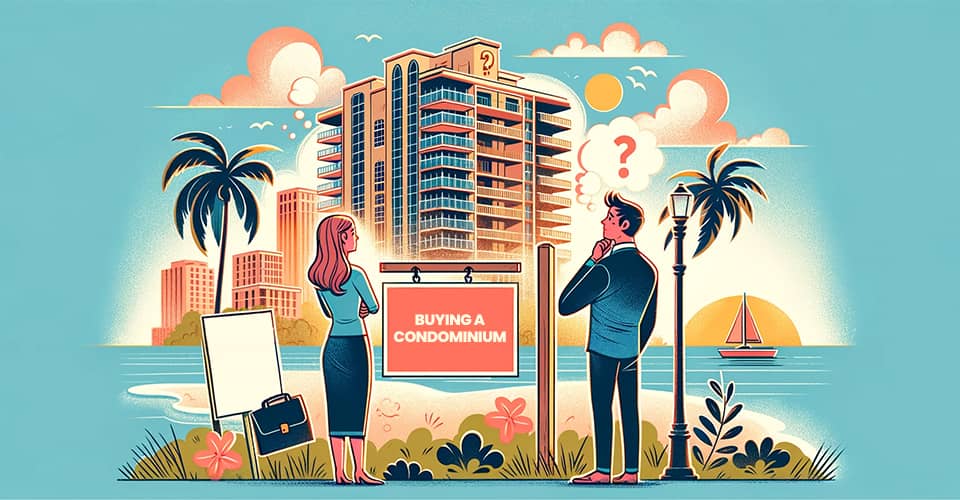Is Buying a Condominium in Florida a Good Idea in 2025? Complete Guide
Condos are a top choice for diverse groups, ranging from first-time homebuyers to investors and empty nesters.
People buy them in droves now because they are cheaper than actual houses, secure, and easier to maintain. Plus, they give owners access to various top-tier amenities, including pools and gyms.
But picking the right condo can be challenging, especially if you aren't armed with the correct information. That is why we have compiled this comprehensive guide.
It will introduce you to everything you need to know before buying a condo, including what defines a condominium and why owning one is splendid.
Let's dive in!
What is a Condo?
A condo or condominium is a residential or housing complex with several separate units. Each unit in the complex belongs to a specific individual. Owners may rent their units to tenants or keep them as apartments or independent houses.
Condominiums come with numerous facilities. The most common include swimming pools, barbeque pits, function rooms, basketball courts, gyms, garages, and outside hallways. Condo owners share these and more.
Condos are suitable for diverse people, ranging from first-time property owners looking for affordable alternatives to expensive family houses to older adults who prefer living in low-maintenance dwellings.
Check Your Eligibility for Florida Condo Loans
Condo vs. House
When comparing condos and houses, it's important to understand their fundamental differences. Condos are single units within a larger building, surrounded by neighbors below, above, and beside.
Houses, in contrast, are stand-alone single-unit residential structures, typically including the building and its land. This distinction in structure and ownership is a key factor in the differences in cost between these two types of properties.
One of the most notable differences is in their pricing. While the median single-family home price in the US was $445,890 in June 2023, the median condo price was significantly lower at $344,652, almost 23% less, according to Redfin.
This price gap is often because when you buy a house, you also purchase the land it sits on, which adds to the overall cost. In contrast, a condo's price primarily reflects the value of the living space itself without land.
Check Your Eligibility for Florida Condo Loans
Condo vs. Apartment
While condos and apartments are units within larger buildings, often sharing similar amenities like communal pools and trash disposal, the key distinction lies in ownership versus renting.
Individuals own condominium units, offering the opportunity for wealth-building through equity accumulation. This aspect of condo ownership is fundamentally different from renting an apartment.
According to Freddie Mac, while condo ownership incurs upfront costs and ongoing homeowner's association (HOA) fees, it enables owners to build equity, unlike renting, where monthly payments do not contribute to any ownership stake.
Moreover, the long-term financial perspective of owning a condo can be more advantageous than renting. As reported by Zillow, owning a condo can, over time, be more cost-effective than renting.
This is due to the potential for property value appreciation and the absence of rent payments, which can fluctuate with market conditions.
Renters do not enjoy the benefits of property value appreciation, which can be a significant advantage for condo owners in a rising market.
Check Your Eligibility for Florida Condo Loans

Buying vs. Renting a Condo
Whether to buy or rent a condo can be a dilemma. If all signs indicate that you'll live in the same place for the next five years or more, buying is more sensible than renting.
To ensure you pick the best option, put together a five-year plan.
Pros and cons of buying a condo
Buying a condo has many benefits over renting. The most prominent include:
-
You can rent out a condo you own and make extra income.
-
A condominium lets build wealth through home equity.
-
You can rent out a unit you own and enjoy tax write-offs.
-
Condos are an excellent investment because their value appreciates over time.
- You can make improvements to a condominium you own.
But purchasing a condo has its downsides, too. Here are some of them:
-
Buying requires a down payment.
- Most buyers must pay closing costs.
Check Your Eligibility for Florida Condo Loans
Pros and cons of renting a condo
Renting is often considered a good option if you plan to stay in a place for less than five years. This timeframe is significant because the first few years of homeownership are usually more heavily weighted toward paying interest rather than building equity.
In fact, for a typical 30-year mortgage, it's not until around the ninth year that your payments start to put a larger dent in the principal than interest.
This principle underlies the "Five-Year Rule" in real estate, suggesting that staying in a home for at least five years is financially prudent to avoid a financial loss due to this amortization schedule.
Pros of Renting a Condo
-
Lower Upfront Costs: Renting usually involves fewer upfront costs than buying a home, often requiring a significant down payment.
-
Flexibility: Renting provides the flexibility to upgrade or downsize relatively easily, which benefits those who anticipate changes in their living situation or are not ready for a long-term commitment to a particular location.
-
Avoidance of Depreciation Risks: As a renter, you're not affected by potential declines in property values, which can be a concern in fluctuating real estate markets.
- No Maintenance Costs: Renters typically don't have to worry about maintenance or repair costs, as these are generally the landlord's responsibility.
Cons of Renting a Condo
-
No Equity Building: Unlike homeownership, renting doesn't allow for equity accumulation. Your rent payments do not contribute to building a personal asset.
-
Lack of Control: Most condo owners don't permit renters to change their units significantly, limiting personalization and customization options.
- Potential for Rent Increases: Renting can sometimes be subject to unpredictable rent increases, depending on the rental market and lease terms.
Check Your Eligibility for Florida Condo Loans
Why Owning a Condo is a Good Idea
Condos come with their fair share of benefits. These include:
Affordability
Most condos cost less than single-family homes, which can largely be attributed to the absence of land costs in the condo purchase.
When you buy a condo, you're essentially acquiring the air space within your walls. This unique aspect of condo ownership makes them 20-30% more affordable than single-family homes in the same area, as buyers are not paying for the land itself.
In addition to the initial purchase price, the long-term financial implications of condo ownership tend to be more favorable when compared to detached houses.
For instance, condo buyers typically spend about 57% less on maintenance and upkeep compared to those who own single-family homes. This is a significant saving, considering the ongoing expenses associated with property ownership.
Beyond the cost benefits, owning a condo also offers an opportunity to build equity. This starkly contrasts renting an apartment, where monthly payments contribute solely to the landlord's wealth.
While the upfront costs of a condo might seem similar to renting, in the long run, condo ownership proves to be a more financially sound decision, especially compared to the high expenses of renting luxury apartments designed for superior convenience and comfort.
Meanwhile, alternatives like detached houses are costlier, primarily because they include ownership of the land they are built on.
On the other hand, mansions not only come with land but also feature privately owned luxury amenities, leading to significantly higher price tags.
Amenities
Condo owners often have top-tier community amenities at their disposal. These include fitness centers, pools, and rooftop terraces. And some condominiums have unique features like spas and tennis courts, too!
Many of the amenities available in condominium complexes are absent in most single-family houses. The reason is that they are expensive to build and install.
For instance, an inground pool can cost anywhere from $28,000 to $55,000 in the United States, depending on shape, size, and materials.
But, since condo owners share the resources and facilities in the complex, you won't have to dish out ungodly amounts to access them after purchasing a unit.
Fewer responsibilities
You may expect to always tackle all interior repairs and maintenance as a condo owner—these cover drywall replacement, plumbing repairs, fixing electric issues, etc.
The condo association is responsible for anything outside your unit's interior space, including the siding and the building's structure.
Therefore, you can safely assume that the board will repair and maintain exterior lighting, the roofing system, and amenities like hot tubs, sidewalks, trails, or walkways.
The best thing is that the homeowners association doesn't charge condo owners exorbitant fees for maintaining and repairing common spaces and resources.
Ready-to-use appliances
You need numerous appliances to live a comfortable life. For instance, your kitchen area can't serve you well without a refrigerator, dishwasher, and stove.
You also need an air conditioning unit, a television, and furniture in the living area. And a home can't be complete without essentials like a clothes dryer, washing machine, and space heater.
Fortunately, modern condominiums come with most must-have appliances. So, all you have to do is move into your unit and use them.
No need to start searching for appliances and buying whatever you can find. Moreover, since the condo is yours, you can replace anything outdated or purchase anything missing.
Security
Security is a paramount concern for many homeowners and renters alike, and in this regard, condos stand out as a particularly secure option. This enhanced security is not just a perception but is backed by concrete statistics.
For instance, residents of gated communities, including many condos, experience a 25% lower crime rate than those in non-gated neighborhoods, according to the National Crime Prevention Council.
Condominiums are often more secure than apartments and similar alternatives due to the presence of reputable security companies guarding the complexes.
Moreover, the likelihood of burglaries in condos is substantially lower than in apartments.
Security Today reports that condo burglaries are 54% less likely than apartment burglaries, a statistic highlighting the effectiveness of stricter access control and security measures in condo complexes.
Top-notch condos often employ a variety of security systems to ensure the safety of their owners.
Check Your Eligibility for Florida Condo Loans
Drawbacks of Condominium Ownership
Condominium ownership comes with the following cons:
No land ownership
Condos don't come with individual land ownership privileges. On the contrary, the plot where a condo complex stands belongs to all homeowners. Therefore, if you buy a condo, you'll share the land's ownership with other owners.
Owning land is a huge plus because this resource is always in demand, and it does not depreciate. On the contrary, people who choose single-family homes and similar properties buy the building and parcel of land it sits on.
As a sole landowner, you can do whatever you like with the property.
Limited space
Most condos are similar to sizable apartments. That means they can be small, especially for families or groups living together.
In addition, although some units come with designated storage spaces, they are smaller and unfit for storing more oversized items like old furniture.
Depending on location, some condominiums offer significantly limited parking spaces. Worse still, some complexes lack this option.
If you own multiple cars, living in a condo where the rules don't allow you to park more than one vehicle at a time can be challenging.
Community rules and limitations
Condo owners live in a community run by a governing board or association. The authoritative body sets rules and regulations that every resident must observe.
For instance, your condo's HOA may bar unit owners from throwing noisy parties or accessing recreational areas after permitted hours.
Some condo association rules also dictate the number of pets you can have in your unit. Living in a condominium with strict rules can be inconvenient, especially for pet lovers and owners who prefer individualizing their dwellings.
Fees
Prepare to pay specific fees after buying a condo. The first is a condominium fee- a levy covering ongoing maintenance costs associated with the complex. The amount you'll need to cover pay depends on your condo's size, amenities within the building, etc.
Typical condo fees are for garbage collection services and the upkeep or repair of the gas, water, cable TV, electric, and sewer systems, among other essentials.
Lack of privacy
All condo owners within a specific complex are part of a small community. Although this isn't inherently bad, privacy can be an issue.
Besides, since units belong to different individuals, a complex may be populated by diverse personalities, ranging from noisy neighbors to nosey people.
Most condo homeowners' associations also install video and audio surveillance systems. These can raise privacy concerns because you, the resident, may not know who monitors them and whether they are intrusive rather than safe.
Check Your Eligibility for Florida Condo Loans
Things to Consider Before Buying a Condo
Buying a condo is a significant investment. It would be best if you did all you could to ensure you made the right decision and ended up with the best property.
That includes factoring in the following:
Your lifestyle and needs
Your lifestyle, needs, and preferences should guide you in picking the proper dwellings.
A condo may be ideal if you spend most of your time away from the house on business trips and similar activities. That is because you won't worry about overgrown flower beds, dirty driveways, clogged gutters, etc., while away.
Condos also come with built-in communities. That makes them suitable for people who like socializing or loners who may benefit from community living.
However, considering other options is highly advisable if you prioritize aspects like owning a backyard over less maintenance.
Amenities included in a condo
Suppose your lifestyle and preferences justify buying a condo. In that case, you should outline the amenities you'd like to access. For instance, if you love swimming and barbequing, include a pool and barbeque pit on your wish list.
Note that some properties come with barebone offerings. Therefore, finding a simple condo won't be impossible if that is what you want.
But if you find a fitting condominium with some facilities you don't need now, consider buying it. It is better to have something you don't need today than regret not having it when circumstances change in the future.
Association rules and regulations
Different HOAs have their own rules and regulations. These apply to all condo owners and their families, tenants, occupants, etc.
For instance, an association may stipulate that homeowners can only own less than two pets or disallow dog ownership for whatever reasons.
Living there will be a nightmare unless you are comfortable with the rules and regulations that your condo association has set out. Therefore, you should carefully go through them and consult with the board.
Property's location
Location is vital, especially if you plan to buy a condo as an investment. Your unit is more likely to fetch higher prices if it's in an area with essential facilities, including healthcare centers, schools, roads, and public transport systems.
Living in a condo in an unsafe or noisy neighborhood can be a headache, too. Therefore, you should pick the location with the utmost care, even if you don't plan on selling soon.
Check Your Eligibility for Florida Condo Loans
The Condo Buying Process
The condo buying process may be lengthy, but following it is indispensable. Failure to do that will likely make your endeavor a fruitless journey.
So, after making the monumental decision to buy a condominium, follow through with the steps outlined below.
-
Step 1: Get a pre-approval from a financial institution like your bank. That will help you establish what you can afford to spend.
-
Step 2: Start searching. You should consult with an experienced realtor or agent at this stage. They will help you locate the best condos, handle negotiations, etc.
-
Step 3: Inspect the options and carefully examine vital features like plumbing, wiring, and the overall condominium structure.
-
Step 4: Make an offer and negotiate accordingly.
-
Step 5: Apply for a loan after establishing the amount you'll need to pay for your condo. If your credit score is good, the chances are high that you will qualify.
-
Step 6: Meet the homeowners association (HOA) or condo board. The association will tell you everything you need to know, including fees to be paid and community regulations.
-
Step 7: Hire an independent home inspector and let them assess the property.
- Step 8: Sign the papers if everything is in order.
Check Your Eligibility for Florida Condo Loans
Frequently Asked Questions
Understanding the Florida condo market can be complex, with various factors influencing your buying decision.
To assist you in making an informed choice, we've compiled a list of frequently asked questions that address key concerns and insights about purchasing a condominium in Florida.
What is the average price per square foot for condos in Florida?
In Miami-Dade County, the average price per square foot for condos has been reported to range from about $535 to $634, based on recent condo sales data.
This price can go as high as $4,703 per square foot for premium properties like those in the Surf Club Four Seasons in Surfside.
On the other hand, the average price per square foot for a condo in Florida was approximately $196.55 as of March 2023, which has been rising over the years.
How do closing costs for condos in Florida compare to other states?
Closing costs in Florida are generally in line with national averages but can vary depending on the location and value of the property. These costs include title insurance, attorney fees, and appraisal fees.
Can foreign nationals buy condos in Florida, and are there any restrictions?
Yes, foreign nationals can purchase condos in Florida. However, they may face certain restrictions or requirements, especially in financing and insurance.
What percentage of condos in Florida are used as vacation homes or rentals?
A significant portion of Florida condos serve as vacation homes or rental properties, with some areas having over 40% of condos used for these purposes, reflecting Florida's popularity as a vacation destination.
Are there any tax benefits or implications specific to owning a condo in Florida?
Florida offers several tax benefits for condo owners, such as no state income tax. However, owners should be aware of property taxes and potential implications for rental income.
How does the hurricane season impact condo living in Florida?
Florida condo owners need to be aware of hurricane season, which can affect insurance costs and necessitate additional safety measures or building reinforcements.
What are the most popular areas in Florida for condo purchases, and why?
Popular areas for condo purchases include Miami, Orlando, Tampa, and the Gulf Coast, each offering unique attractions such as beaches, entertainment, and business hubs.
How does the resale value of condos in Florida compare to new constructions?
Resale value can vary, but well-maintained condos in good locations generally maintain strong resale value, sometimes competing closely with newer constructions.
What are the environmental considerations for condo living in Florida, like energy efficiency or sustainability?
Many newer condos in Florida incorporate energy-efficient designs and sustainable materials, reflecting growing environmental awareness and often resulting in lower utility costs.
How do condo association rules vary across Florida, and what should potential buyers look out for?
Condo association rules can vary greatly in Florida. Potential buyers should thoroughly review the association's bylaws and regulations, paying attention to pet policies, rental restrictions, and maintenance responsibilities.
Check Your Eligibility for Florida Condo Loans
Final Thoughts
Numerous reasons support the decision to buy a condominium. First, condos are more affordable than single-family homes.
Plus, they promote a greater sense of community and security. And not to mention that condo owners tackle fewer maintenance and repair requirements than other property owners.
Although condo ownership has drawbacks, including no land ownership and lack of privacy, the accompanying benefits outweigh them. But don't make an impulsive decision without considering your lifestyle, budget, needs, and preferences. Good luck!
With over 50 years of mortgage industry experience, we are here to help you achieve the American dream of owning a home. We strive to provide the best education before, during, and after you buy a home. Our advice is based on experience with Phil Ganz and Team closing over One billion dollars and helping countless families.

About Author - Phil Ganz
Phil Ganz has over 20+ years of experience in the residential financing space. With over a billion dollars of funded loans, Phil helps homebuyers configure the perfect mortgage plan. Whether it's your first home, a complex multiple-property purchase, or anything in between, Phil has the experience to help you achieve your goals.


 By
By  Edited by
Edited by 






